Search engine optimization remains one of the most decisive elements in driving sustainable online visibility.
As search behavior evolves and competition intensifies across nearly every sector, the choice of an SEO partner becomes a strategic lever, capable of compounding long-term growth or silently bleeding marketing budgets.
If you are navigating this landscape, the term “best SEO company” will be frequently encountered, yet rarely defined with the precision or context it deserves.
This blog will present a comprehensive, criteria-based analysis of what constitutes excellence in the SEO industry. It cuts through surface-level branding and marketing polish to examine the operational, strategic, and ethical fundamentals that separate a service provider from a strategic growth partner.
Rather than endorsing one-size-fits-all agencies or trend-based rankings, this article aims to inform high-stakes decision-making through an objective and nuanced lens.
As a result, choosing the “best” SEO company can align with actual business needs, risk tolerance, and long-term performance expectations.
Table of Contents
What Defines the ‘Best’ SEO Company?
There is no universal formula for identifying the best SEO company, but there are strategic markers that distinguish high-performing agencies from transactional vendors. These indicators help assess whether an agency is engineered for sustainable results or short-term optics.
- Transparency: A best-in-class SEO firm offers full clarity around deliverables, reporting, and pricing. Reports should be data-driven, explain shifts in performance, and disclose both wins and failures without concealment.
- Proven ROI: Real performance isn’t measured in keyword rankings alone. The best SEO companies can link their efforts to measurable business outcomes, such as revenue lift, lead generation, or customer acquisition cost reduction.
- Tailored Strategies: Effective agencies resist generic templates. They build custom roadmaps based on market research, technical audits, audience intent, and a brand’s competitive positioning.
- Innovation: With search algorithms and SERP formats constantly evolving, the top agencies actively test, adapt, and pioneer new methodologies. Innovation reflects both technical leadership and future-readiness.
- Long-Term Results: Short-term spikes from black-hat tactics are not sustainable. The leading firms focus on compounding growth through ethical link building, high-quality content, and strategic technical foundations.
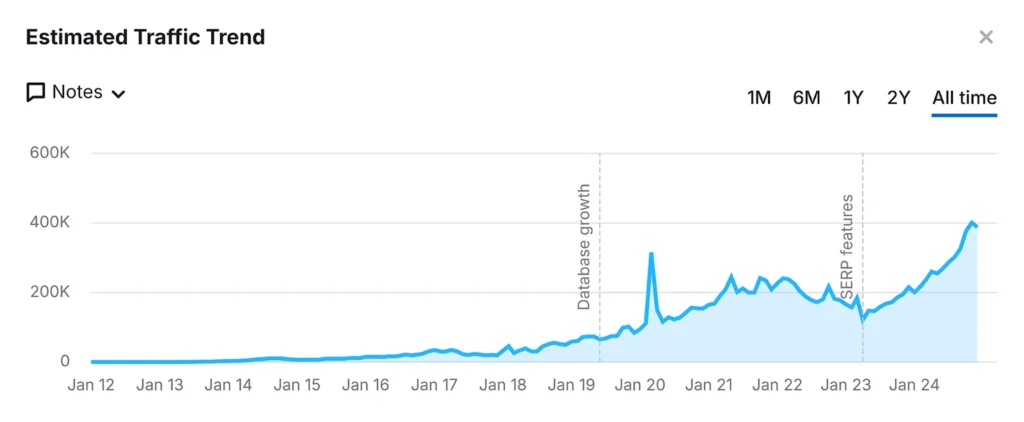
It May Take Several Months to Notice the Long-Term Benefits of SEO Campaigns
Understanding these core pillars is crucial because many agencies still sell vanity metrics, like first-page rankings for non-commercial or low-volume keywords.
These can inflate reports while offering no real ROI. Sustainable performance, by contrast, emphasizes consistent traffic quality, behavioral engagement, and bottom-line impact over months or years.
Additionally, the client-agency fit matters deeply. An agency may deliver outstanding results in SaaS but lack the contextual expertise for eCommerce or local services.
Industry specialization ensures strategies are adapted to buyer journeys, competition levels, and regulatory constraints unique to each domain.
Methodology Behind the Analysis
This blog’s assessment of top-performing SEO companies isn’t based on surface-level rankings or pay-to-play awards. Instead, it applies a hybrid framework combining qualitative insights, performance benchmarks, and peer-reviewed indicators.
The selection process considered five primary sources:
- In-depth client testimonials across various industries and project sizes
- Verified case studies with transparent KPIs and traffic-to-conversion data
- Long-term review patterns from independent platforms like Clutch and G2
- Company transparency in methodology, pricing structure, and reporting frequency
- Third-party audit reports and visibility benchmarks using tools like Ahrefs, SEMrush, and Similarweb
A Beginner’s Guide to Conducting A Comprehensive SEO Audit
Each agency was analyzed against a weighted rubric of 20+ variables grouped into four core areas: effectiveness, scalability, ethical integrity, and retention rate.
The goal was not to reward popularity but to identify companies that consistently deliver sustainable SEO performance across industries and timeframes.
Additionally, contextual adaptability was prioritized over universal tactics. Instead of evaluating agencies based solely on their global footprint or marketing spend, we emphasized how well they tailor solutions to specific sectors: enterprise SaaS, local service businesses, eCommerce, or B2B consulting.
This methodology ensures that the term “best” reflects actual operational excellence, not algorithmic visibility or branding muscle.
Ultimately, the agencies selected in the next section have demonstrated strategic foresight, technical precision, and a proven ability to deliver SEO outcomes that matter to real businesses.
Top SEO Companies in the World: A Comparative Snapshot
Choosing an SEO company involves far more than browsing search rankings or award banners. Each of the world’s top SEO agencies brings a different approach, pricing model, and specialization.
Some are built for enterprise environments, while others excel in vertical-specific SEO or high-growth eCommerce.
This section will outline five globally recognized firms, selected based on long-term performance, methodological transparency, and relevance across industries.
WebFX (United States)
WebFX is a full-service digital marketing agency known for its data-centric SEO execution. It maintains a strong in-house analytics infrastructure and offers clients robust performance dashboards.
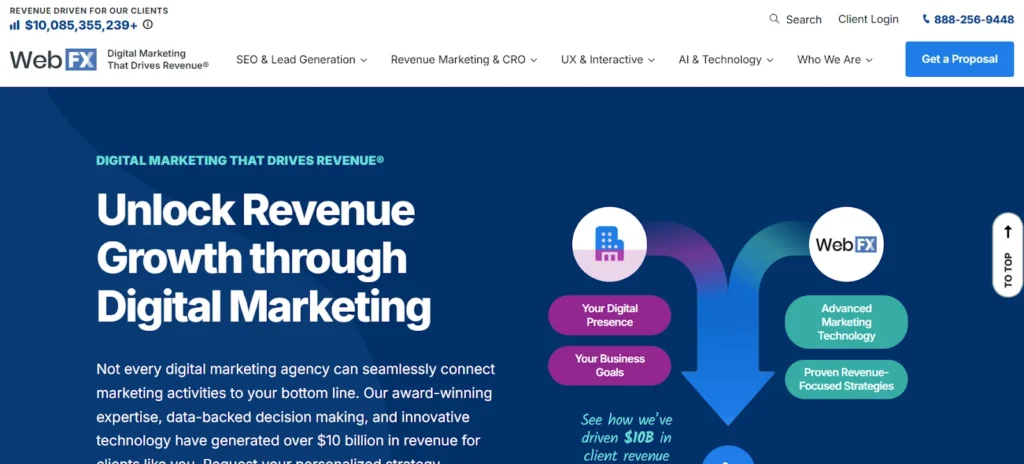
- Key Strengths: Custom SEO dashboards, granular performance tracking, integration with CRM platforms
- Industry Focus: SMBs, manufacturing, healthcare, B2B
- Pricing Tiers: Tiered packages from ~$1,200/month to enterprise retainers above $10,000/month
- Unique Value Proposition: Proprietary tech platform (MarketingCloudFX) offering cross-channel attribution and ROI analysis
WebFX balances scalable service models with strong client support, but some smaller businesses may find the platform-oriented approach overwhelming if internal bandwidth is limited.
NP Digital (United States)
Founded by Neil Patel, NP Digital leverages both personal branding and performance-backed SEO. It is especially effective for enterprises with complex technical and content needs.
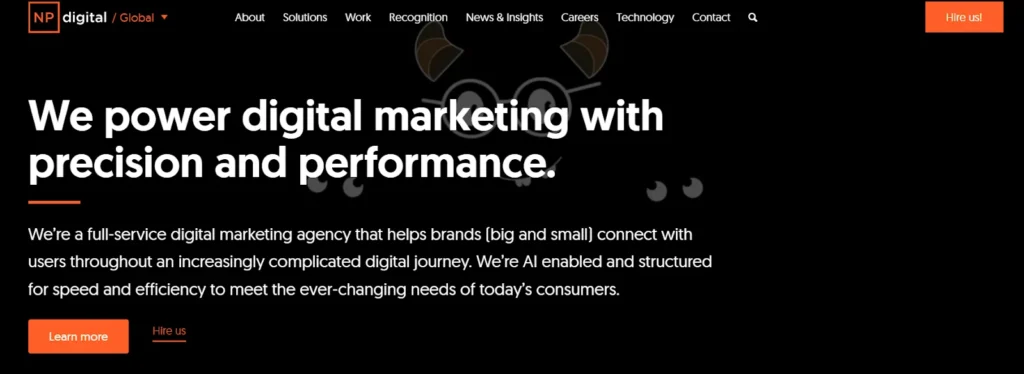
- Key Strengths: Content strategy integration, conversion rate optimization, multilingual SEO
- Industry Focus: Enterprise B2C, SaaS, fintech, global brands
- Pricing Tiers: Mid- to high-range retainers, with custom pricing based on scope
- Unique Value Proposition: Strong thought leadership combined with high-end consulting and in-depth audits
While NP Digital excels in scalability and enterprise alignment, its strategy-heavy approach may be excessive for businesses seeking fast execution over long-term consulting.
Seer Interactive (United States)
Seer Interactive stands out for its ethical approach to data and deep investment in analytics. Its team frequently works with large datasets to shape SEO decisions based on real user behavior.
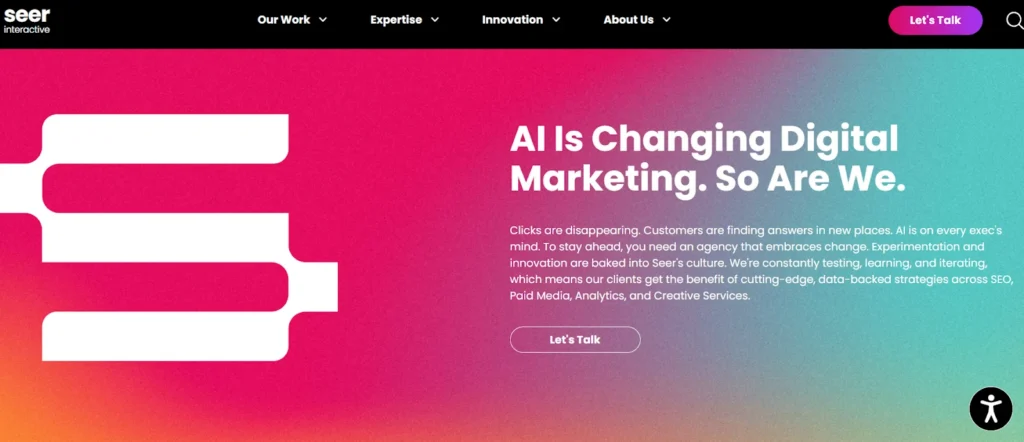
- Key Strengths: First-party data analysis, user-intent modeling, transparency in strategy
- Industry Focus: Non-profits, education, eCommerce, healthcare
- Pricing Tiers: Typically high-end, designed for clients with clear digital maturity
- Unique Value Proposition: Strong commitment to privacy-first marketing and SEO tied closely to actual behavior signals
Seer’s strategic depth is ideal for businesses that view SEO as an integrated part of brand building. However, the analytical complexity may not align with companies seeking speed or budget efficiency.
The Upper Ranks (United States)
Unlike full-service agencies, The Upper Ranks focuses almost exclusively on ethical link building. This makes it a strong choice for companies with internal SEO teams needing scalable off-page support.
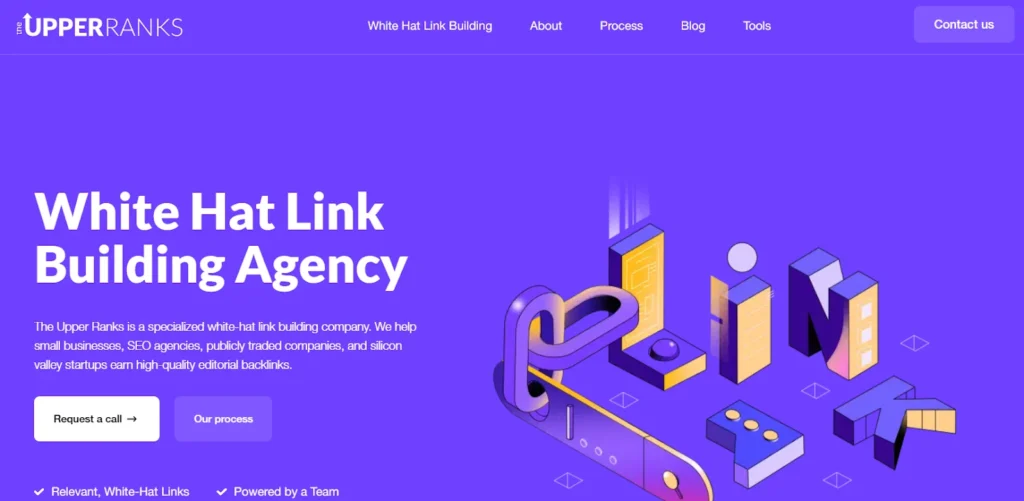
- Key Strengths: Relationship-based link outreach, editorial placements, white-label options
- Industry Focus: Agencies, SaaS, eCommerce, startups
- Pricing Tiers: Flexible pricing; project-based or monthly retainers depending on volume
- Unique Value Proposition: Hyper-specialized link-building expertise without content fluff
This focused approach brings depth rather than breadth. However, it assumes the client already has on-page and technical SEO addressed internally or through other vendors.
Re:signal (United Kingdom)
Re:signal is a UK-based agency specializing in organic growth for eCommerce brands. It has a strong presence in the EU market and often works with retailers seeking ROI-focused SEO at scale.
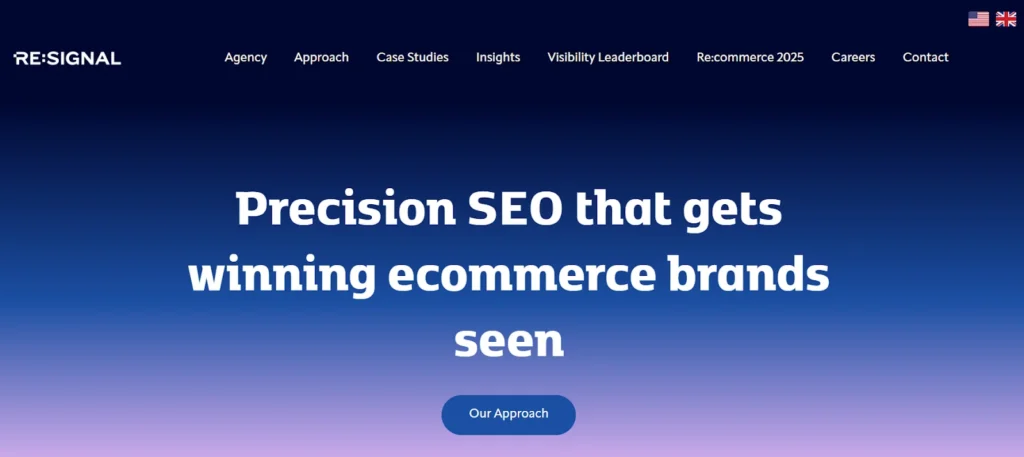
- Key Strengths: Technical audits, content performance optimization, international SEO
- Industry Focus: Retail, eCommerce, DTC brands
- Pricing Tiers: Medium to high-end retainers, based on complexity and market size
- Unique Value Proposition: A narrow but deep focus on performance marketing for commerce-driven sites
Re:signal is ideal for eCommerce teams needing technical sophistication and clear performance benchmarks. Its narrower focus, however, may limit broader multi-industry suitability.
Deep Dive: Case Study of the Leading SEO Company
Evaluating a top-tier SEO agency demands more than performance snapshots or client lists. Understanding its operational mechanics, strategic philosophy, and measurable outcomes is vital, especially if you are considering long-term investment.
For this case study, let’s examine WebFX, one of the most consistently high-performing SEO firms globally, through the lens of core business impact.
Strategic Framework and Approach
WebFX’s SEO model is heavily data-driven. It integrates custom-built tools like RevenueCloudFX to gather behavioral data and forecast keyword opportunities.
Their approach combines search intent analysis with competitor benchmarking to develop content and technical recommendations grounded in both algorithmic relevance and conversion potential.
Unlike many firms, WebFX structures its SEO process around business KPIs rather than surface-level keyword ranks. Performance audits are not only routine but automated, giving stakeholders full access to campaign changes, lead attribution, and channel-specific ROI.
Technical Sophistication and Customization
A key differentiator is WebFX’s capability to execute at scale without sacrificing granularity. The agency delivers beyond foundational SEO from enterprise-grade schema deployments to advanced log file analysis.
For clients with legacy systems or custom CMS platforms, WebFX deploys development and UX consultants to streamline integrations and resolve crawl issues.
Additionally, their emphasis on A/B testing in content deployment (especially for product or service landing pages) demonstrates a commitment to agile iteration, not static delivery.
Case Outcome Metrics
One example involves a mid-sized B2B client in the industrial supply sector. The campaign spanned 18 months and included technical SEO remediation, blog strategy, local SEO optimization, and link building. Results included:
- 172% increase in organic traffic year-over-year
- 47% increase in qualified leads via organic channels
- 22% reduction in bounce rate across priority pages
- 61% ROI improvement based on CRM-integrated attribution
What’s notable is not just the growth, but the transparency in reporting. Every KPI was tracked back to the original strategy documents and aligned with the client’s sales cycle.
Lessons from the Case
WebFX’s success here underscores the importance of data centralization, full-funnel alignment, and human support behind scalable systems.
This level of integration is often a strong indicator of performance consistency if you are evaluating SEO partners, especially when teams need both control and visibility across large digital ecosystems.
What to Look for When Choosing an SEO Partner
Selecting the right SEO company involves much more than assessing credentials or testimonials. A poor fit can drain both budget and momentum. Use these criteria to make a high-stakes decision with low risk.
- Alignment with Business Objectives: Ensure the agency builds strategies around your specific revenue and conversion goals, not just rankings or traffic spikes.
- Transparency and Reporting: Reliable partners offer complete visibility into both success metrics and setbacks. Access to real-time dashboards and clear audit trails is a baseline requirement.
- Technical Capability: SEO today demands more than on-page optimization. Assess whether the agency handles technical SEO, including crawl diagnostics, core web vitals, structured data, and mobile-first indexing.
- Content and UX Integration: Modern SEO is inseparable from content strategy and user experience. An agency should bridge these areas with A/B testing, UX audits, and conversion copywriting.
- Scalability and Flexibility: As your business grows or shifts direction, the SEO partner should scale efforts accordingly without pushing rigid, templated deliverables.
- Specialization in Your Sector: Industry-specific experience allows faster execution and higher-quality results. Whether B2B SaaS or multi-location retail, familiarity with your niche reduces learning curves and missteps.
- Ongoing Education and Adaptation: Top firms adapt rapidly to algorithm updates, SERP changes, and platform shifts. Look for agencies that invest in continued learning and openly share their methodological shifts.
Choosing an SEO partner should feel like onboarding a strategic growth department, not outsourcing a checklist. When that alignment is secured, long-term digital performance becomes sustainable and compoundable.
Do You Need the “Best” or the “Right” SEO Company?
Many equate “best” with the largest or most visible agencies, but top visibility does not guarantee alignment with your specific goals. The “best” firm in general rankings may excel at broad strategies yet lack depth in niche verticals or localized markets.
By contrast, the “right” partner fits your unique business model, budget parameters, and long-term roadmap from the outset.
Consider transaction size, industry complexity, and internal capacity to separate prestige from practical capability. An enterprise brand might benefit from an award-winning global agency, while a regional service provider often needs hyper-local expertise.
Evaluating case studies in your sector and requesting references for businesses of similar scale can reveal compatibility beyond marketing claims.
Ultimately, aligning on culture, communication style, and risk tolerance reduces the likelihood of project scope drift and performance plateaus. Prioritize decision frameworks that balance track record with strategic fit, rather than chasing universal acclaim.
Rigorous vetting should include scenario-based discussions, such as handling algorithmic changes or crisis management, to test responsiveness and adaptability before signing a contract.
Opting for the “right” SEO partner can ensure resources are invested in growth pathways that align with your brand’s competitive differentiators and operational capabilities.
Future-Proofing Your SEO Investment
Effective SEO investments anticipate shifts in search behavior, technology, and market dynamics. Future-proofing strategies require layering autonomy, ethical practices, and innovation into every campaign.
- Embrace AI and Machine Learning Tools: Integrate algorithmic insights for predictive keyword modeling, content optimization, and automated reporting to gain a competitive edge in dynamic SERP landscapes.
- Prioritize Voice and Visual Search Readiness: Implement structured data, natural language elements, and high-quality visuals to optimize content for conversational queries and image-based discovery.
How to Optimize Your Site for Voice Search
- Invest in Robust Technical Foundations: Maintain site speed, mobile performance, core web vitals, and scalable architectures to accommodate evolving platform requirements.
- Diversify Backlink Profiles Ethically: Cultivate varied, high-authority link sources through partnership content, thought leadership, and community engagement, safeguarding against future algorithm adjustments.
- Monitor Emerging Channels and Formats: Stay informed on developments like AI-generated content, AR/VR previews, and platform-specific SEO features to adapt strategies proactively.

Source: Arm Newsroom
- Foster Continuous Education and Collaboration: Ensure internal teams and agency partners participate in regular training and knowledge sharing to remain aligned with best practices and industry updates.
Conclusion
Selecting an SEO company is a strategic investment, not a checkbox exercise. You can align resources with measurable outcomes by distinguishing between the “best” in generic rankings and the “right” fit for your specific market.
A partner that combines technical sophistication, ethical integrity, and contextual expertise offers sustainable growth and resilience.
As search algorithms evolve and user behaviors shift, embed future-proofing measures (like AI integration, voice and visual search readiness, and solid technical foundations) into your SEO roadmap.
Rigorous vetting and ongoing collaboration will ensure your investment delivers compounding returns, transforms your digital presence, and supports long-term business objectives in an ever-changing landscape.


